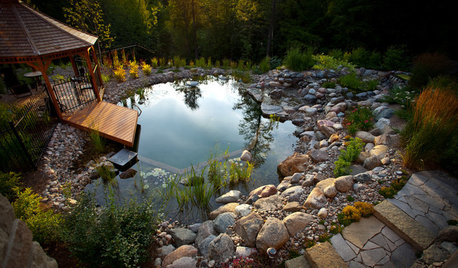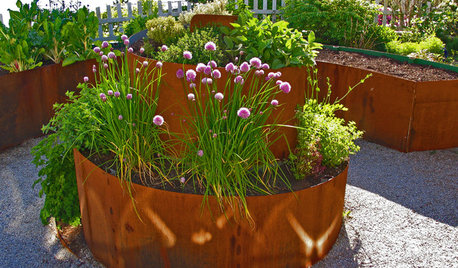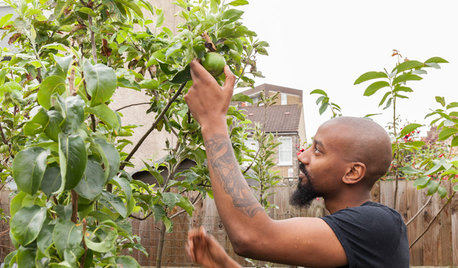Effects of too much Potassium?
Hi folks,
I own a yard that has been basically neglected (by me) for the last five years up until last Fall, and based on what it looked like when I first moved in, quite a bit longer than that.
Last Fall I renovated (Round-Up, new seed, some starter fert) and this year I would like to encourage it further. But I am wondering if I am putting down too much Potassium. After five years of doing virtually nothing, with my new seeding last Fall I put down a starter fertilizer in quantities that resulted in 1.2 lbs. Potassium per thousand feet.
This year I have already put down one pound of Potassium per 1,000 square feet, between a half-application of fall fertilizer that should have gone down (at twice that amount) in November, and the Potassium content of the "Double-O-Seven" Dimension product by Lesco.
I am wondering two things: first, can this amount of Potassium hurt my grass? Reading around I thing the answer is "no," but I'd really appreciate some expert opinion on that.
Second, how does an excess of Potassium in the soil hurt the environment, if at all? This is important to me mainly because my storm sewers run maybe a thousand feet before emptying into the Long Island Sound.
I know the best way to determine Potassium content in my soil is with a soil test, and after my recent amendments have "soaked in" awhile I plan to get one. But given the many previous years of total neglect of this lawn, I am thinking that I may not be very far from optimal at this point, but would very much appreciate hearing your opinions.
Thank you,
Paul
Comments (31)
paulinct
Original Author16 years agolast modified: 9 years agoThank you Morpheus, that's really great information! And certainly much better than I got from Google....
And you are right about this yard: it has been so neglected that my new KBG started yellowing late last year in what looked like an obvious display of nitrogen starvation, even after 1.2 lbs/1000 of the stuff went down. Granted, I failed to get the Winterizer down, but with fertile soil I would not have expected that dramatic a display even after missing the Winterizer.
I'm very much open to organic fertilizing, though I am very skeptical of organics as insecticides/herbicides. If I can figure out a way to make them work together in a way that I understand I will certainly use them both. That debate is so often phrased in black or white, and the grays seem to me not easy to understand. But my gut keeps telling me that the organic approach to pest eradication just simply does not work.
Yes, we have tons of sand. But this area was a tomato farm for many, many years before it was sold off for development in the 1950s, when my house was built. And even though the local old-timers still remember the trucks coming in to take out the topsoil in order to sell it before the houses went up, most of us still have roughly one foot of rich topsoil capping 10 feet of sand above the water table. It really couldn't be much better.
Thanks again.
Best,
PaulRelated Professionals
Ballwin Landscape Architects & Landscape Designers · Grand Haven Landscape Architects & Landscape Designers · Bristol Landscape Contractors · Clark Landscape Contractors · Hampton Bays Landscape Contractors · Harrisburg Landscape Contractors · Lakewood Landscape Contractors · Leicester Landscape Contractors · Longview Landscape Contractors · Oak Forest Landscape Contractors · Plymouth Landscape Contractors · West Chicago Landscape Contractors · Eastlake Landscape Contractors · Glendora Swimming Pool Builders · Lincoln Swimming Pool Builderslou_spicewood_tx
16 years agolast modified: 9 years agoPaul,
Beneficial nematodes work great as pest control. It leaves the good ones alone unlike those chemical pesticide.
Herbicide? I barely ever use it and I don't have much of weed problem to speak of. It's the by product of maintaining lawn organically because weeds do not thrive on improved soil as good as the ones in poor soil. You just have to understand how soil biology works and it's easy from there.
paulinct
Original Author16 years agolast modified: 9 years agoHi Lou,
Please forgive my ignorance, but are these "beneficial nematodes" inclined to eradicate crabgrass?
If not, are they inclined to destroy all of the various beetles that can cause grub damage?
If not, what is the value of them? I would very much appreciate your thoughts on these things!
Also, I should revise my previous comments to make clear that I think that if you already have a more or less healthy, thick and weed free lawn (perhaps thanks mostly to previous synthetic interventions?) the organic approach may work better than it would for those of us struggling with more marginal lawns. Like mine (except for the new stuff, at least how I expect it to be by the Fall!).
Best,
Paulmorpheuspa (6B/7A, E. PA)
16 years agolast modified: 9 years agoI'm very much open to organic fertilizing, though I am very skeptical of organics as insecticides/herbicides.
Understandably. As Lou stated above, nematodes are great and a given species will go after just about anything that's bothering you. Also, for us in the north, Milky Spore bacteria is great for grubs. I use that myself.
The trick to organic pesticides are tuning the attacker to the invader. The Milky Spore I put in the lawn only kills Japanese Beetle grubs (well, one or two others not native to the northeast as well), but does a great job of it.
Most other bugs I don't worry about. Ants? They aerate fairly well. Grasshoppers? I think they're adorable and they don't eat much. An organic lawn (or even a well-maintained synthetic one where pesticides aren't over-used) maintains its own balance pretty well.
Herbicides, not so much. The only one I can think of offhand is vinegar (horticultural, which is more concentrated). I don't like it because if you get that in your eye you're really going to know it...assuming you don't burn your cornea.
That debate is so often phrased in black or white, and the grays seem to me not easy to understand.
People around here range from pure organic to pure synthetic and a number of us are in between, including myself. I'd class myself as a fairly bright gray. My primary feed is soybean and I don't use herbicides much...and never use insecticides.
When I do use an herbicide, it's the least toxic thing I can manage. I did just have to spray down a bunch of roughstem bluegrass with Certainty, as well as the crabgrass that's already starting to sprout. However, I replaced my lawn last year so there are plenty of small holes.
Weed and feed is practically the most toxic thing you can do. Spot spraying is minimally toxic, and even area spraying with Weed-B-Gone or something like it isn't that bad.
For feeding, feed with organic sources. That's a start. They'll eventually encourage the lawn to get very thick and minimize your weeds. Milorganite (available almost anywhere), any name brand (expensive), soybean meal from your local grain mill (cheaper)...any work.
You don't sound like you need much soil help, which is great. The organics will hold the nutrients and release them slowly to the plants.
There's a FAQ around here but I stink at finding those things...
lou_spicewood_tx
16 years agolast modified: 9 years agoPaul,
Beneficial nematodes is biological pesticide, not herbicide. You probably will have to use weed b gon to spot spray crabgrass although properly maintained lawn will help cut down numbers of them. I get a few now and then so I just pull them out and throw them away. Weeds thrive in soil where the nitrate level (type of nitrogen) is high and with organic program, it tends to go down making it more difficult for weeds to take over the lawn. You will see significantly higher nitrate level in the soil where synthetic fertilizer are being used. That's why we have ALL KINDS of herbicide. Samething with pesticide. My guess is that lawns exposed to synthetic fertiler tend to be less healthy and bugs are attracted to plants that are stressed or not healthy.
bpgreen
16 years agolast modified: 9 years agoRegular Weed B Gone is a broadleaf herbicide, so it won't work on crabgrass. If you get WBG to kill crabgrass, make sure you get one that says it is for crabgrass.
arjo_reich
16 years agolast modified: 9 years agoRegarding the original question of the effects of too much potassium...
While I don't know if there is a direct correlation between these random pieces of data, it may be interesting to throw it out there.
1. I understand that potassium helps roots grow.
2. My soil survey reported I had very high (330+ ppm) of potassium.
3. The bermuda grass in my yard, which I killed out during the renovation would put out such heavy stolon growth that there were several times while mowing the lawn my foot would get tangled in a mess of them and I would nearly trip and fall into the deck of my mower.
My soil sample came back with my potassium levels listed as "very high" (330+ p.p.m.) in my front lawn.paulinct
Original Author16 years agolast modified: 9 years agoThank you very much guys, for all of that information, I need some time to digest it. But I can say that Morpheus, I agree on the vinegar: it works because it is so incredibly caustic, and I would think that even some synthetics would be superior to that for various reasons, including most prominently risk of injury.
lou_spicewood_tx
16 years agolast modified: 9 years ago10% Vinegar is sufficient. You don't need 20%. I wouldn't even touch it. You really don't understand anything about soil biology, do you?
Read this links...
http://www.soilfoodweb.com/03_about_us/approach_pgs/a_01_benefits.html
http://soils.usda.gov/sqi/concepts/soil_biology/soil_food_web.htmlSynthetic herbicides are WORSE. So are synthetic pesticides!
Example - Weed and feed will kill some trees and shrubs.
Sevin pesticide will kill 90-95% of earthworm population and who knows what else just to kill a few pests.
But hey, that's your lawn. Do whatever you want to do.
paulinct
Original Author16 years agolast modified: 9 years agoI knew it would come to this...
Look Lou, I think you are "blinded by the light." If you can't see the inherent problems with the links you posted, well I guess that is fine with me. If you want to accuse me of "not understand[ing] "anything about soil biology" after what you just posted, well, ha ha, I'll just enjoy the irony.
"Weed and Feed" is a concept, not a product. Different companies realize that differently.
Sevin is just nasty, and I don't use it.
Look Lou, I would LIKE to agree with you, but your intellectual content is just so incredibly lacking that I simply cannot agree with you. You look like the perennial objector to me. Objecting to synthetics, no matter what, and facts be damned.
If you want to try again I would be glad to hear you out. Just have some facts at your disposal please.
dchall_san_antonio
16 years agolast modified: 9 years agoHelp us out Paul. I don't see the problems you see in Lou's links. What did Lou say that was ironic?
I don't mean to be calling you out on this, but you might give a full organic program a try and see how it works. It costs about the same as what you're doing now. Don't transition anything. Simply stop using any chemicals and use only organic fertilizer (we like the ground grains in the plain brown bags from the feed store to save a bundle of money). I can tell you the benefits of organic but you (not you specifically but all y'all folks who simply deny that organics will work) are very slow to catch on. It is also possible to be blinded by the darkness. How much proof do you need to put corn meal on your lawn??? None.
The first thing I noticed after using ground grains as a fertilizer was that my grass turned the darkest color of green that it had ever been. Next I noticed that the birds, lizards, toads, and geckos returned to my yard. They are all carnivores that eat the bugs, so my insect population is controlled by the predators now. The first thing I noticed when using ordinary corn meal as a "fungicide" was that the aphids disappeared from my roses. I check this every year, all year long, and the last aphid infestation I had was in 2001 prior to my change to organic. I have seen this same effect (disappearance of aphids) demonstrated in a research greenhouse. The company that did the research does not publish, they hold their results private and sell soil mixes that out perform the stuff you get at the store. When I was on a chemical program, I never knew what to use next, whether to water it in or put it on wet grass, whether to apply in full sun or no sun, etc. It was too complicated. With the organic program, none of that matters (with the exception below). Once you have well-fed microbes, the micro-ecosystem takes over the controls and you can back off.
I don't know what to say about vinegar. I sprayed some weeds last weekend. The weeds in the full sun turned into crispy black spots in 20 minutes - no kiddin'. The weeds in the full shade (same plant, different location) were not even slightly stressed after 24 hours. To me that says it is not the low pH of the vinegar that does the work. There is something magic about vinegar in the sun.
morpheuspa (6B/7A, E. PA)
16 years agolast modified: 9 years agoExample - Weed and feed will kill some trees and shrubs.
Sevin pesticide will kill 90-95% of earthworm population and who knows what else just to kill a few pests.
If I were to spray Weed-B-Gone on my trees and shrubs it would kill 'em, too. Spraying with 10 or 20 percent vinegar isn't going to work wonders, either. It certainly isn't surprising that an herbicide...kills plants.
Sevin is pretty nasty stuff. Nobody I've ever seen has advocated using it here. I'd put it just behind Malathion for toxicity to creatures...including me.
About the only time I'd recommend pulling out the big insecticidal guns is for something like an infestation of thrips. Otherwise, I am content to let nature do her work in peace.
That debate is so often phrased in black or white, and the grays seem to me not easy to understand.
You just met white. Regrettably, white can't see gray as anything but black. I'm presuming black won't see gray as anything but white, but I've never seen that here. Yet.
arjo_reich
16 years agolast modified: 9 years agoMixing vinegar with warm/hot water before application will really help if applied on cloudy/cool days.
Randomly, for those with children. Nearly boiling vinegar is a great way to remove gum from carpet. Apply, blot, blot, scrape, scrape, apply, blot, blot, clean. Or something to that effect. Hell, I've used it to take melted plastic off carpet before... ;-p
paulinct
Original Author16 years agolast modified: 9 years agoHi Dchall,
Thank you for your thoughtful post. The irony I mentioned is that vinegar is an acid that kills plant tissue on contact, and that this is the whole reason it works, but (unless I missed it) there was no mention of this fact in the articles Lou linked to in response to my earlier post stating just what I have just stated.
Of course, vinegar also happens to be an "organic" product. So to see those links talking about "organic" soil care, which in the main I tend to agree with, without any discussion of what happens, not only to the weed leaves (and the unfortunate desirable plants that get the overspray), but also to the microorganisms living in the soil, when you pour powerful acids on them, like those contained in vinegar, well, that was a little rich for me. I mean, for a truly organic approach why not lay down some of the acids expelled by active volcanoes (sulfuric? hydrochloric?) on your lawn? Well, because that would be absurd, of course.
I mean no disrepect here, but how could I possibly believe in the organic approach to pesticides (particularly pre-emergent herbicides) when well known organic folks like yourself both (1) suggest CGM as a crabgrass preventer on these forums in a sort of knee-jerk reaction whenever the subject comes up, and (2) admit, in other threads (like you did recently here), that they probably don't work.
Look, given the choice, I would choose the product that causes the least harm to the environment over the opposite. But if I think I am being fed BS science by a bunch of people who care more about politics than the reality, I will feel comfortable making my own assessments.
Hope that makes sense!
Paulmorpheuspa (6B/7A, E. PA)
16 years agolast modified: 9 years agoI will feel comfortable making my own assessments.
Standing ovation.
I just shot my Poa annua with Round Up with weekend to get rid of the stuff. Organic...nope. Guilt level...zero. Since I spot-sprayed very conservatively, taking out a few hundred small plants used just a few ounces of mix.
garycinchicago
16 years agolast modified: 9 years agoPaul:
Just curious here, have you ever seen a picture of one of these deep, dark green, lush, weed free, organically fed lawns before?
Personally, I haven't.
paulinct
Original Author16 years agolast modified: 9 years agoThank you guys,
Morph, what you say makes perfect sense to me.
Gary, to answer your question in a word, "nope," and I think that is a great observation on your part.
There is so much good information to be had on this forum, it is just a shame to see so much bad advice given and recycled all the time in the spirit of "going green." And I don't mean that as a reflection on the organic approach as a concept, but rather how it is presented here (and in many other places, of course), which so often seems to be a prescription for failure. I mean, it could be done much better!
Best,
Paularjo_reich
16 years agolast modified: 9 years agoMy wife and I got into a little "debate" over the whole new "green works" brand of cleaners on the market. I'm all for products that are less harmful to the environment but at one point during the debate she mentioned that it was "organic" and therefore did not contain "chemicals".
It is *that* specific mentality that I dislike. I'd like to consider myself a very "organic" person - hell, I compost everything from my dryer lint to my snotty tissues, lol - however the fact remains that just because something is not "synthetic" that it is not a "chemical".
I might have crossed the line when I told her "if you're confident that it's chemical free and safer for you, go ahead and take a swig of it then..." :ducks:
I use vinegar, when handy, simply because "it's _handy_" and often times a lot less muss and fuss then to have me pull out the RoundUp super-concentrate and mix up a small batch of it. That and it makes me feel a little "MacGyver-ish"...
paulinct
Original Author16 years agolast modified: 9 years agoI think I am with you there, reminds me of the hilarious "campaign" against dihydrogen monoxide. I mean, our rivers and reservoirs are just full of the stuff, and if you get too much of it into you lungs, you are gonna die!
It is a "chemical," of course, but it is also known simply as "water."
philes21
16 years agolast modified: 9 years agoLet me, respectfully, stick up for the organic guys, for just a moment. I Are Not One. But I do respect, from hanging around here several years, the fact that they have a healthy suspicion about chemicals, and the effect that chemicals, and those as-yet unknown side effects might have on our bodies, or our environment, or our children. The notion, forty years ago, when I was a teenager in the construction business, summer job, dirty work, all of that, that we would:
a. be cautious of lead based paint, or even gasoline, or
b. not tear out asbestos insulation bare handed and bare headed, or
c. wear a face mask for anything other than halloween, or
d. wear seatbelts in the truck, or
e. stop smokingwas completely foreign to me. Not understandable. And, as each of these situations developed, all we, as a society, received, was a very general 'well, we know better now'. I'll bet we do, we put a man on the moon, this is 1969 for crying out loud. But that was all we received, "Well, we know better now". Indeed, over the last five years, there have been several lawn chemicals, used for various things, that have been outlawed. Because what, we know better now? Yep. That's it. That's all you get.
So being a little skeptical of the chemical industry as a whole is, in my view, a healthy thing. Certainly not a waste of time.
I'd like to note, in addition, that the organic crowd isn't trying to sell you anything. They are sharing their experiences, as do we all, in hopes of helping out with a little advice.
Then you've got the purely synthetic, or nowadays perhaps labeled 'rigid' guys, who truly believe, It's Got To Be Scotts (or perhaps, Ortho), on the lawn. If it doesn't say Turf Builder, why buy it? You Get What You Pay For.
I Are Not One. (to use the same bad slang as I did up above). There are less expensive, more focused, better ways to improve a lawn that paying for, and then putting down, Scott's. Yet there are some lawn guys who just plain swear by it, and who wouldn't use anything else. When they offer their advice, they are, sincerely, trying to help out, as well.
There's a third group, somewhere in the middle, which may even turn out to be the largest of the groups. Likewise, when this group offers advice, they are trying to be helpful, and are not trying to sell you a subscription to anything.
So there we are, at least three groups of us, doing our best to offer time, advice, experience, and an example or two.
But we have to do it with typing. Black letters, on a white page. We don't get tone of voice. We don't get facial expression. We don't get those conversational abbreviations. Hmmmm. Ah. Huh? Eh? As a function of that, our conversation is quite limited, limited (and thus deficient) by the internet.
It's too easy to take something (typed out) the wrong way. I dont think anybody here is trying to dictate behavior, nor to say "I am smart and you are stupid". Further, if it looks like that, don't, do not, take it that way. Remember first, that we're limited by typing. The way you just took it is NOT the way it was 'said', but it wasn't said, it was typed.
Morph could say to me, here in this forum, the following. I'm going to give you three examples. It's just Morph talking. He's typing, just as he would talk. He's not an English professor, he's a lawn guy. He's typing that way, because he talks that way.
...to edge the lawn at the driveway, sheesh, you have to wet it down first, on the driveway overlap.....
...to edge the lawn at the driveway, man, you have to wet it down first, on the driveway overlap....
...to edge the lawn at the driveway, boy, you have to wet it down first, on the driveway overlap.....
Have to? I HAVE TO? I don't have to do SQUAT. And 'boy'? BOY? I surely HOPE you said ROY.....
What did I take offense at, really? Is it true that Morph is not somehow 'safe', typing just the way he talks? (Do I, or you, think that Morph should have written ..."I surely recommend that you consider the benefits of moistening the overlapped grass, in hopes that the result will be a cut that is easier on your blade of your electric trimmer"?)
You can see that I took it wrong, on that third one.
Lets not do that. Let's recognize that everybody's trying to help.
morpheuspa (6B/7A, E. PA)
16 years agolast modified: 9 years agoHave to? I HAVE TO? I don't have to do SQUAT. And 'boy'? BOY? I surely HOPE you said ROY.....
I firmly stand on the conviction (often, if anecdotally, proven) that many people will do what they're going to do regardless of what I say. Sometimes a well-chosen phrase can deflect that path a bit.
My phrasing would have been:
I've found it helps to edge the driveway after a rain, or you can cheat a bit and water the driveway edge the night before if you want to.
Alpha male silverback gorillas wouldn't take offense at that. :-) Which is good, as I stand five-eight and tilt the scales at 140 lbs.
I'd like to note, in addition, that the organic crowd isn't trying to sell you anything.
Except a philosophy, which is fine...however, like any given religion that shows up at my door, I have the right to refuse the information or start analyzing inconsistency.
Now that organic methodology is backed with some data, it's become a science. Unfortunately, the number of blind spots is a bit too high and it has a regrettable history as a pseudoscience (now there's a misnomer...). At least the tendency is starting to change.
As far as the synthetic/organic "war" goes, I'm part of the big group that stands in the middle. I see applications of both, try to be as minimally toxic as I can be, but I am not going to try to remove several thousand weeds by hand. A few hundred, sure.
Lets not do that. Let's recognize that everybody's trying to help.
That having been said, a factual error can certainly be corrected and most of us take that correction very well and learn from it.
My one major remaining prejudice is muddy thinking. When I discover I'm doing it I do my best to rout it out. When I see it in others, I correct it. Otherwise, the error simply perpetuates itself.
Funny you should say that about the English professor thing. If things has gone just a bit differently...well, they didn't, and I would have been happier in the hard sciences anyway.
Here is a link that might be useful: (Mostly) Organic Lawn Photos
paulinct
Original Author16 years agolast modified: 9 years agoI agree with all of that, but mostly that the "hard sell" that is going on is the philosophy. And in the modern rather than 19th century understanding of that term...
decklap
16 years agolast modified: 9 years agoVinegar, if you choose to use it, does not harm the soil at all. It breaks down and doesn't effect the ph or microbial activity in the soil at all. At all.
paulinct
Original Author16 years agolast modified: 9 years agoHi decklap,
Yes, it breaks down eventually, but not immediately. So your blanket statements about acetic acid having absolutely zero effect on either soil microbes or pH (while it is killing all of the plants it touches) makes no sense to me. I'd be glad to be proven wrong on this, but I have been searching and can't find anything to support what you are saying. Do you have a source?
Thanks,
Paulturf_toes
16 years agolast modified: 9 years agoVinegar, if you choose to use it, does not harm the soil at all. It breaks down and doesn't effect the ph or microbial activity in the soil at all. At all.
My understanding is that is the same case for Roundup. So, I'm not sure what the advantage would be for Vinegar. (Unless you're planning on eating your lawn as a salad. :>) )
decklap
16 years agolast modified: 9 years agoSince they're both effective I think the question might be why glyphosate in the first place. Of all the chems on the market it is one of the more benign but it might be worthwhile to do a web search sometime on "glyphosate resistance". In my state three weed species have developed a resistance to glyphosate, some states more and some state less. But regardless this is not at all uncommon when chems with a single mode of action go into wide usage. If you ever have a chance to talk to some old timer turf guy have 'em rattle off all the chem products that have completely lost their effectiveness over the years because of developed resistance, I think it'd shock most people. Silver bullets don't exist.
paulinct
Original Author16 years agolast modified: 9 years agoThank you for that decklap,
But it was, of course, a diversion rather than an answer.
If you can't answer the simple questions I and others have posed, well I guess that will not surprise me.
And I will take that as supporting my own thoughts of course.
So thank you for your contribution to the synthetic pesticide movement!
Paul
morpheuspa (6B/7A, E. PA)
16 years agolast modified: 9 years agoMy understanding is that is the same case for Roundup.
It is. I've read (not that I can find it offhand here at work) that glyphosate soil binds. I know the manufacturer states its biodegadation half-life is variable, but it does exist.
Vinegar will also corrode metals, so it'll happily grab onto the metals present in your lawn and bind with them. I'm not sure of the impact on microbes, but do know that a swiftly-changing pH isn't good for the little critters. Barring widespread overuse, I wouldn't think the impact would be critical.
Very few complex compounds last eternally in soil, or even for a long period. If there's energy in the chemical bond, somebody will eat it and call it a light snack. If there isn't but the element is necessary, photosynthetic energy may be applied to gather it by breaking energy bonds.
decklap
16 years agolast modified: 9 years agoThey're just facts Paul. I can't help how you or anyone else feels about them.

















morpheuspa (6B/7A, E. PA)